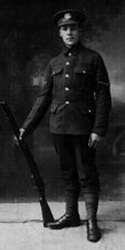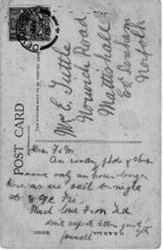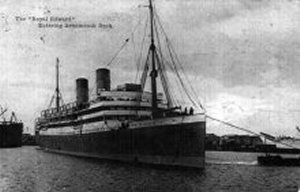Sometime during 1914 Teddie enlisted into the Norfolk Regiment, the 3rd (Special Reserve) Battalion (14). He enlisted at Great Yarmouth and gave his address as Great Yarmouth, I have not found out why unless it was because he was at that time living with his brother Ernest William who was then married and living there at the time. On Saturday 8th August 1914 the 3rd Special Reserve were sent to Felixstowe. In addition to taking a hand in the defence of the Harwich coastline against a possible invasion, the battalion had the duty of training and despatching drafts overseas. It was practically debarred from going abroad as a battalion and the task demanded from it as a special reserve was a far more weary and thankless one. It had to accept thousands of recruits, equip and train them and as soon as the men showed promise to draft them off to other regiments. It seems that Teddie wanted to see active service and so he and some other Norfolk men volunteered to join the Essex Regiment and they were in the draft of July 24th 1915. It was a custom in the Great War for a soldier to be issued with a different number when he changed regiments so Teddie who by this time had become Lance Corporal Tuttle No 17596 of the Norfolk Regiment, became Lance Corporal Tuttle no.20637 of the Essex Regiment. This arrangement was altered in 1920 when a soldier was given a regimental number on joining and kept it thereafter no matter to which other regiment or corps he was posted. A postcard with the postmark 'Devonport' and dated 31st July 1915, 9.45am and with 1/2d stamp addressed to Mrs.E.Tuttle,Norwich Road,Mattishall, East Dereham,Norfolk arrived, it read: "Dear Father & Mother, Am sending a photo of ship have only an hour longer here as we sail tonight at 8 o/c Friday, Much love Ted Don't expect letter just yet. Farewell". The picture was of the 'Royal Edward' entering Avonmouth dock. A passage from the History of Norfolk Regiment tells the rest of Teddie's story: Colonel Tonge refers to the loss of 300 men, the best draft that ever left Felixstowe. These men volunteered to join the Essex Regiment and appear to have constituted the drafts of June 23 and July 24 1915. They were part of the reinforcements carried by the transport "Royal Edward" which was torpedoed and sunk in the Aegean Sea on August 14th 1915. She sank two and a half minutes after the torpedo struck her.Of the 1,400 men she carried only 600 were saved,and the drowned included all but 18 of the 300 Norfolk men. The men who had had a route march just before leaving Alexandria, were waiting on deck for foot inspection at about 9.20 am. Their lifebelts were down below, and when the ship was unexpectedly struck most of them ran below to fetch the belts. Owing to the ship's sudden heeling over and sinking, these never got up again. Those who escaped were picked up by a hospital ship which responded to the s.o.s. signal. To partly replace this sad loss, another draft of 150 men to the Essex Regiment was dispatched on September 29, 1915. Addenda 1994 From: "Men of Gallipoli"(David & Charles,1988) by kind permission of the publishers. One of the features of the Cape Helles monument is the rows of names of men drowned in the torpedoing of the Royal Edward,which sank in the Eastern Mediterranean on 13th August with a loss of over 850 lives.A.T.Fraser in the Border Regiment,was in a deckchair on the afterdeck starboard side when suddenly dozens of men ran past him from port to starboard. The explosion came before he had time to ask what was the matter."The ship had no escort and we had not been ordered to have our life-belts with us.The hundreds on deck ran below to get their life-belts and hundreds below would have met them on their way up.I shared a cabin accessible from the deck I was on and I raced there to get my life-belt and ran to my life-boat station which was on the star- board side.As the men arrived they fell in two ranks. Already the ship was listing and this prevented our boats from being lowered,so we were ordered to jump for it.I saw no panic,but of course one could imagine what was happening on the inside stairs. I swam away from the ship and turned to see the funnels leaning towards me.When they reached the sea,all the soot was belched out,there was a loud whoosh and the ship sank. No explosion,no surge.So I was alone.The little waves were such that in the trough you saw nothing,on the crest you saw a few yards.The water was warm.I wondered if there were sharks". Fraser found some wood to rest on and he was joined by a seaman,an older man who had twice previously been torpedoed.This brought the young Scot confidence.An up turned Royal Edward lifeboat was to provide 17 of the survivors with a little more security though in what Fraser calls half-hourly recurring turbulence,the boat turned over,offering them conventional but completely waterlogged accommodation every alternate half hour but at least providing them with something to do.There was no singing and little conversation. The first ship that passed hailed the scattered men and promised to signal for help.It could not stop as it had high explosives for Lemnos.Some of the men became depressed and showed unwillingness to clamber back in the life boat when it overturned,but on each occasion all were persuaded.Finally the hospital ship SOUDAIN arrived to pick them up in her life-boats,and at 2 o'clock Fraser was safely aboard her after just under five hours in the sea. He remembers that"a large number of men lost their false teeth as we were constantly sick in the sea- and these men were sent back to England.We the younger ones,were clothed and kitted and on another ship three days later for Gallipoli 20637 Lance Corporal Edward James Tuttle, 1st Battalion Essex Regiment, died on Friday, August 13th 1915 ( The date from 'History of the Norfolk Regiment said 14th August and the date on the back of the photograph of him, written by his mother, says 15th August, but the Essex Museum confirms August 13th as being correct) He was aged 20 years and has no known grave. He is remembered on Cape Helles Memorial,Gallipoli,Turkey, panel no. 229-233(Royal British Legion) Also in Mattishall Church. Special Provisions Act 1957 Death Certificate has him listed as Private Tuttle Edward James age 20 England 13.8.1915,at sea, drowned. The Private is an error. On remembrance Sunday 1989, a wreath of poppies was placed at the base of the Cape Helles Memorial, the message read: "In fond remembrance of a brave young soldier. It took us three years but we are so pleased we found your last resting place Teddie. Pauline and John." (This was from myself, and my brother who had helped with the early research) Sometime later a request for a photograph of the memorial was granted and clearly shows the name of Lance Corporal Edward James Tuttle, 1st Battalion Essex Regiment.
Sent by Edward James Tuttle on a Postcard



